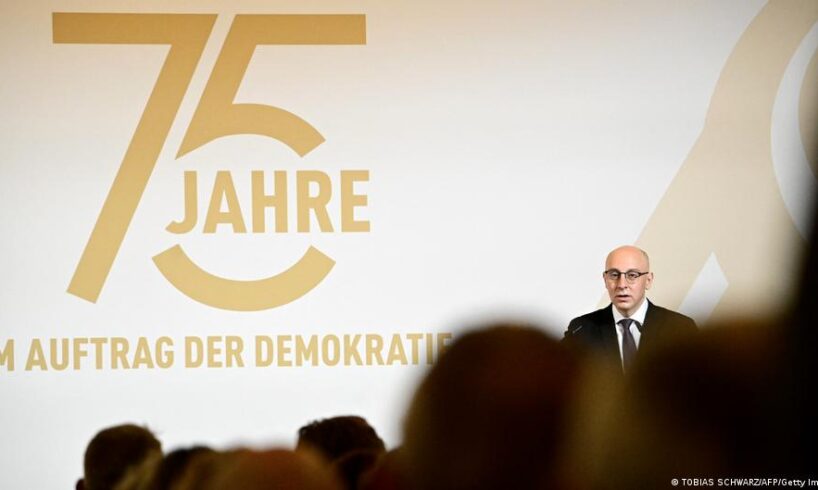
When officials from the Verfassungsschutz (BfV), Germany’s domestic intelligence agency, report on threats to internal security in Germany, they almost always refer to politically and religiously motivated extremism. But since Russia invaded Ukraine in violation of international law, one new threat has never gone unmentioned: what is known in technical jargon as a “hybrid threat.”
In October, at the ceremony marking the 75th anniversary of the domestic intelligence service in Berlin, its director, Sinan Selen, clarified what this essentially means: “Sabotage, espionage, cyber attacks and targeted campaigns, especially by Russia.” Targeted campaigns aim at influencing the decision-making of individuals and governments, for example, through the dissemination of misinformation and propaganda.
Sabotage, espionage, cyber attacks
The Office for the Protection of the Constitution must be constantly on the alert for old and new threats. Its founding on November 7, 1950, in Cologne was in part a response to the beginning of the Cold War between the capitalist West and the communist East. Espionage was as much a part of its repertoire at that time as military armament with nuclear weapons.
Security loopholes in Germany’s parliament spark concern
To view this video please enable JavaScript, and consider upgrading to a web browser that supports HTML5 video
Bad memories of the Gestapo during the Nazi era
Despite this threat, there was strong public resistance to the creation of a new intelligence service for West Germany. During this year’s ceremony, former Federal Constitutional Court judge Udo Di Fabio recalled that Germans then were still haunted by the fear of the Gestapo during the Nazi era.
“The fear of those men in leather coats who came at dawn to kidnap the defenseless who had been denounced by cowards and took them to torture chambers and concentration camps,” he said.
With this historical backdrop, the victorious powers of World War II decreed that the domestic intelligence service could only observe and monitor potential enemies of democracy. On the other hand, investigations, house searches or arrests of suspects were and are the responsibility of the police.
Claim of success cannot be independently verified
The BfV is meant to be an early warning system for protecting Germany’s free and democratic constitutional order. When attacks by Islamists or right-wing plots to overthrow the government are stopped, this security agency, officially called an intelligence service, often takes credit for these successes.
AfD party labeled ‘extremist’ by German intelligence
To view this video please enable JavaScript, and consider upgrading to a web browser that supports HTML5 video
But it is part of the secret service’s mandate not to disclose the sources of its findings. It is only allowed to pass on its findings to the police and inform the Bundestag’s parliamentary control committee. This committee comprises members of parliament who are responsible for ensuring that the Office for the Protection of the Constitution operates correctly. For example, the communications of suspects may only be monitored with permission from a judge.
Keeping tabs on terrorists, including the 9/11 masterminds
Beginning in the 1970s, the focus increasingly shifted to left-wing extremism. The Red Army Faction (RAF) terrorized what was then West Germany with kidnappings, bombings and assassinations. When the RAF disbanded in 1998, the Office for the Protection of the Constitution was given a respite — but only for a short time.
On September 11, 2001, Islamists flew planes into the skyscrapers of the World Trade Center in New York, killing nearly 3,000 people. The plans for these unprecedented attacks had been hatched in Hamburg. Although the German domestic intelligence service was keeping an eye on the masterminds, they were left undisturbed.
For many years, the greatest threat to democracy has been right-wing extremism, something that the Office for the Protection of the Constitution has also stressed.
However, the agency came under suspicion after the revelations about the National Socialist Underground (NSU), a terrorist group that murdered 10 people between 2000 and 2007, came to light. There were many reasons for this, such as questionable contacts within the agency with right-wing extremists who were paid as informants and the destruction of files related to the NSU.
Germany’s domestic intelligence agency under fire, over its handling of a deadly neo-Nazi cell # nsu14d # 05.07.2012 15 Uhr # Journal # englisch # nicht im Mediacenter
To view this video please enable JavaScript, and consider upgrading to a web browser that supports HTML5 video
Despite a number of scandals, Federal Interior Minister Alexander Dobrindt of the conservative Bavarian Christian Social Union (CSU), who is in charge of the agency, avoided words of criticism at the ceremony to mark the anniversary of its founding. On the contrary, he was full of praise.
“The Federal Office for the Protection of the Constitution was, is and remains a guarantor of freedom, security and the rule of law in Germany,” he said.
In the secret service’s sights: the Left Party and the AfD
The domestic intelligence service also repeatedly makes headlines for its surveillance of politicians and political parties.
This affected and continues to affect the socialist Left Party and, above all, the Alternative für Deutschland (AfD), which is classified as a right-wing extremist party. In many court cases that have been brought, the agency only prevails part of the time.
Di Fabio, the former Constitutional Court judge, views the particularly challenging task of the Office for the Protection of the Constitution as maintaining a balance between gathering information and spying. In addition to technical methods such as telephone surveillance, informants are also used.
For Di Fabio, two questions are crucial: “What are effective methods for tracking enemies of democracy and gathering information about them? And where should we draw the line so as not to cause uncertainty in society?”
For 75 years, the Office for the Protection of the Constitution has been navigating the tension between freedom and security in the interest of protecting democracy.
This article was originally written in German.
Fear, power, remembrance — Dresden’s Stasi headquarters
To view this video please enable JavaScript, and consider upgrading to a web browser that supports HTML5 video
While you’re here: Every Tuesday, DW editors round up what is happening in German politics and society. You can sign up here for the weekly email newsletter, Berlin Briefing.





